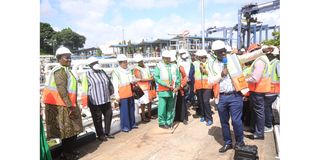
Our Projects are
Transforming African Trade
Quick Contacts
2nd Floor, Fidelity Insurance Centre Waiyaki Way, Westlands

What you need to know:
They questioned the authorities on their commitment to ensuring that all cargo leaves the port within a maximum of five days after completing all customs procedures
Dar es Salaam. Members of the East African Legislative Assembly (EALA) visited the Dar es Salaam port on February 8, 2024, and raised concerns over key challenges affecting users of the facility in particular and the central corridor in general.
Led by the Chairperson of the Committee on Communication, Trade, and Investment (CTI-EALA), Rutazana Francine, Eala members highlighted the challenge of cargo delays and issues related to cargo storage facilities, which increase cargo handling costs at the port.
“We started our visit on the central corridor on February 4. We meet stakeholders, including operators, investors, traders, and customs officials from both here and EAC member countries. Despite being satisfied with the performance of the port, they raised a few challenges,” stated Rutazana, an Eala member from Rwanda.
Ms Rutazana questioned the port management on their commitment to ensuring that all cargo leaves the port within a maximum of five days after completing all customs procedures.
She expressed bewilderment at the persistence of complaints about cargo delays, leading to fines imposed on traders.
“Another issue is the increased demand for the port; are there other areas for cargo storage to enhance efficiency?” she added.
Responding to these concerns, Mussa Biboze, the representative of the director of the Dar es Salaam Port, said the port operates efficiently despite some minimal challenges, often attributed to freight forwarding agent officials or incomplete documentation.
Regarding limited storage space, Biboze informed the representatives about the utilisation of the Kwala Dry Port, which is expected to reduce cargo congestion by up to 60 percent.
“We have the Kwala Dry Port, which has started operations, and a few kilometres from here, we have another cargo handling area under the Export Processing Zones Authority (EPZA). Despite its small size, we have plans to start using it for some cargo handling services,” he stated.
Another member of CTI-EALA, David Ole Sankok, expressed satisfaction with what they observed, stating that Tanzania has more opportunities to invest in the blue economy due to its abundant water resources.
However, he urged EAC member countries to increase investment to boost exports over imports.
“Development is achieved by exporting more goods. Here we have sufficient infrastructure, but where are the goods to transport? We have started with leather products, and last December, we passed laws to increase restrictions on importing these products,” added Ole Sankok.
He emphasised that such visits help them assess the actual conditions of business and investment infrastructure, enabling the formulation of policies and laws that will aid regional countries in achieving their goals of increasing exports.
Read original article
Disclaimer: The views and opinions expressed in this article are those of the authors and do not necessarily reflect the official policy or position of TradeMark Africa.